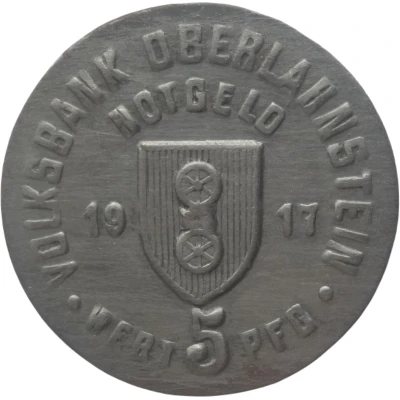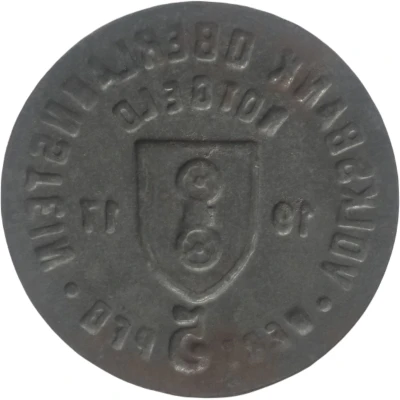


© Willem63 (CC BY-NC-SA)
5 Pfennigs - Oberlahnstein
1917 year| Iron | 0.7 g | 19.9 mm |
| Issuer | City of Oberlahnstein (Prussian province of Hesse-Nassau) |
|---|---|
| Issuing bank | Volksbank Oberlahnstein |
| Emperor | William II (Wilhelm II) (1888-1918) |
| Type | Standard circulation coin |
| Year | 1917 |
| Value | 5 Pfennigs (5 Pfennige) (0.05) |
| Currency | Mark (1914-1924) |
| Composition | Iron |
| Weight | 0.7 g |
| Diameter | 19.9 mm |
| Thickness | 0.4 mm |
| Shape | Round |
| Technique | Milled |
| Orientation | Medal alignment ↑↑ |
| Demonetized | Yes |
| Updated | 2024-10-04 |
| Numista | N#51526 |
|---|---|
| Rarity index | 87% |
Reverse
Lettering from obverse in mirror image
Edge
Plain
Comment
Issuing body: [Volksbank, Hessen-Nassau].Interesting fact
One interesting fact about the 5 Pfennigs - Oberlahnstein 1917 coin is that it was issued during a time of economic turmoil in Germany. The country was facing severe inflation, and the value of the German mark had dropped significantly. As a result, the government decided to introduce a new currency, the "Notgeld," which included coins like the 5 Pfennigs - Oberlahnstein 1917. These coins were made of iron and had a low denomination, making them more accessible to the general population. Despite their low value, they were still considered a valuable asset during a time of economic uncertainty.